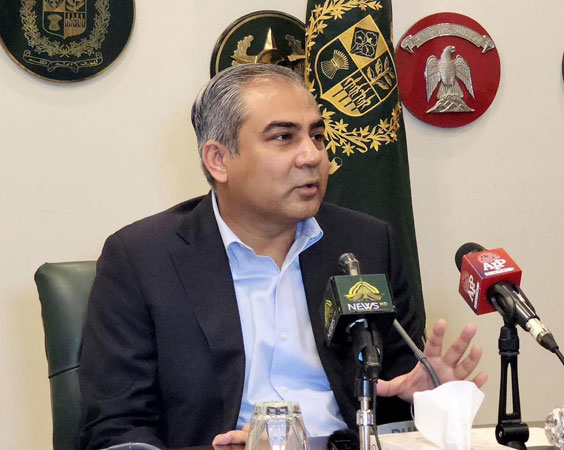 Interior Minister Mohsin Naqvi on Wednesday criticised the recently proscribed Pashtun Tahaffuz Movement (PTM) for its rhetoric amid reports of violence ahead of the three-day Pashtoon Qaumi Jirga in Khyber district.
Interior Minister Mohsin Naqvi on Wednesday criticised the recently proscribed Pashtun Tahaffuz Movement (PTM) for its rhetoric amid reports of violence ahead of the three-day Pashtoon Qaumi Jirga in Khyber district.
He said that the government was ready to talk on rights-related issues with anyone if done in a “proper manner”.
At least three people were killed in clashes Wednesday between police and protesters, angered by a government ban imposed on the organization, sources said.
Officers fired tear gas and swung batons to disperse protesters who had gathered in the town of Jamrud, near the city of Peshawar to denounce the ban.
Footage on social media showed police firing in the air, unleashing tear gas and wielding batons among the crowd, which responded by throwing stones at the officers.
On Sunday, the federal government imposed a ban on the PTM, citing threats to national peace and security. A day ago, the Khyber Pakhtunkhwa government prohibited its officials and employees from engaging with the three-day Pashtoon Qaumi Jirga, also called the Pashtun Qaumi Adalat, organised by the PTM and issued a public warning against any association. Khyber Deputy Commissioner retired Captain Sanaullah Khan also imposed Section 144 in the district for 30 days.
The move came in the lead-up to the grand jirga, scheduled for October 11 in Khyber district. Diehard activists assembled at the venue of their three-day jirga in Jamrud on Sunday evening in clear defiance of the federal government’s order and vowed to hold the gathering.
Addressing a press conference in Islamabad on the matter, Naqvi recounted the ban on the group by the federal government and said no one had an issue if people wanted to organise a jirga.
“Jirgas have been held before and will continue being held and no one has an issue with it. A jirga comprises a gathering of tribal elders, bringing people in the thousands is not called a jirga but something else.”
On the one hand, he said that the gathering was being referred to as a jirga and on the other hand, it was being referred to as a court.
The security czar said the government decided to not allow a “parallel judicial system” at any cost, adding that the ban was based on the alleged rhetoric by the PTM against state institutions and the police.
“You are talking about division in the nation by promoting ethnic divide. You can definitely [talk] about political topics and rights but … it cannot be permitted that you try to turn the nation against the institution.”
He said he was aware that leaders from a few major political parties had met PTM leaders and expressed solidarity on the issue of rights, but they had made it clear that talking about rights while advocating taking up weapons was not possible.
Naqvi said there was no further contact between the two groups after that meeting.
“People tried to make them (PTM) understand and said if it was a matter of rights then let us all speak as one,” he said, adding that the federal government was also ready to sit down and have talks about human rights with those “who only talk about rights in a proper manner”.
He said it was not possible that “state institutions were relentlessly slandered for years” and the federal government did nothing and remained silent.
“Anyway, it was banned and then the KP government placed 54 people on the Fourth Schedule and Balochistan placed 34.”
He said the federal and provincial governments were bound by the law to seal offices of proscribed organisations and there were many restrictions placed on them such as media, financial services, travel, arms licences and identity documents.
“It has been banned. Now, whoever assists them in any way or tries to help them out will also fall under these sanctions.”
The interior minister further alleged that videos and visuals of the PTM were shot by “foreign companies with external funding”.
“Whoever masters are behind you, we have a clear message for them that if you do this (spread division) in our country, then we will treat you accordingly”, Naqvi asserted.
“Then don’t expect that you will try to spread discord in our country and we will remain silent. The same is the message for the anarchists that there will be no forgiveness.”
Naqvi said intrigue and taking up arms against the country could not be allowed.
Earlier in the day, a two-member bench of the Peshawar High Court (PHC) restrained the PTM from holding the jirga on disputed land, directing the police to take action to maintain law and order.
The PHC issued a stay order to stop the event on the disputed land and adjourned the case till October 15. The bench consisted of Justice Attiq Shah and Justice Sahibzada Asadullah.
The additional attorney general told the court that the PTM was banned by the federal government and its activity was prohibited under the law.
He said that action by law enforcement agencies against any banned organisation was legally permissible, adding that the land being used for the gathering was also disputed.
A resident of the district had moved the PHC against the PTM’s jirga.